Caution and Hope for International Business Families
Tanya crossman
When TCK Training released our white paper, Caution and Hope: The Prevalence of Adverse Childhood Experiences in Globally Mobile Third Culture Kids, we knew we were only beginning to scratch the surface of what we could learn from the data we had collected from 1,904 individuals who completed our 2021 survey on developmental trauma in globally mobile Third Culture Kids. This is part of a series of blog posts that looks a little deeper at certain sub-groups represented in the data.
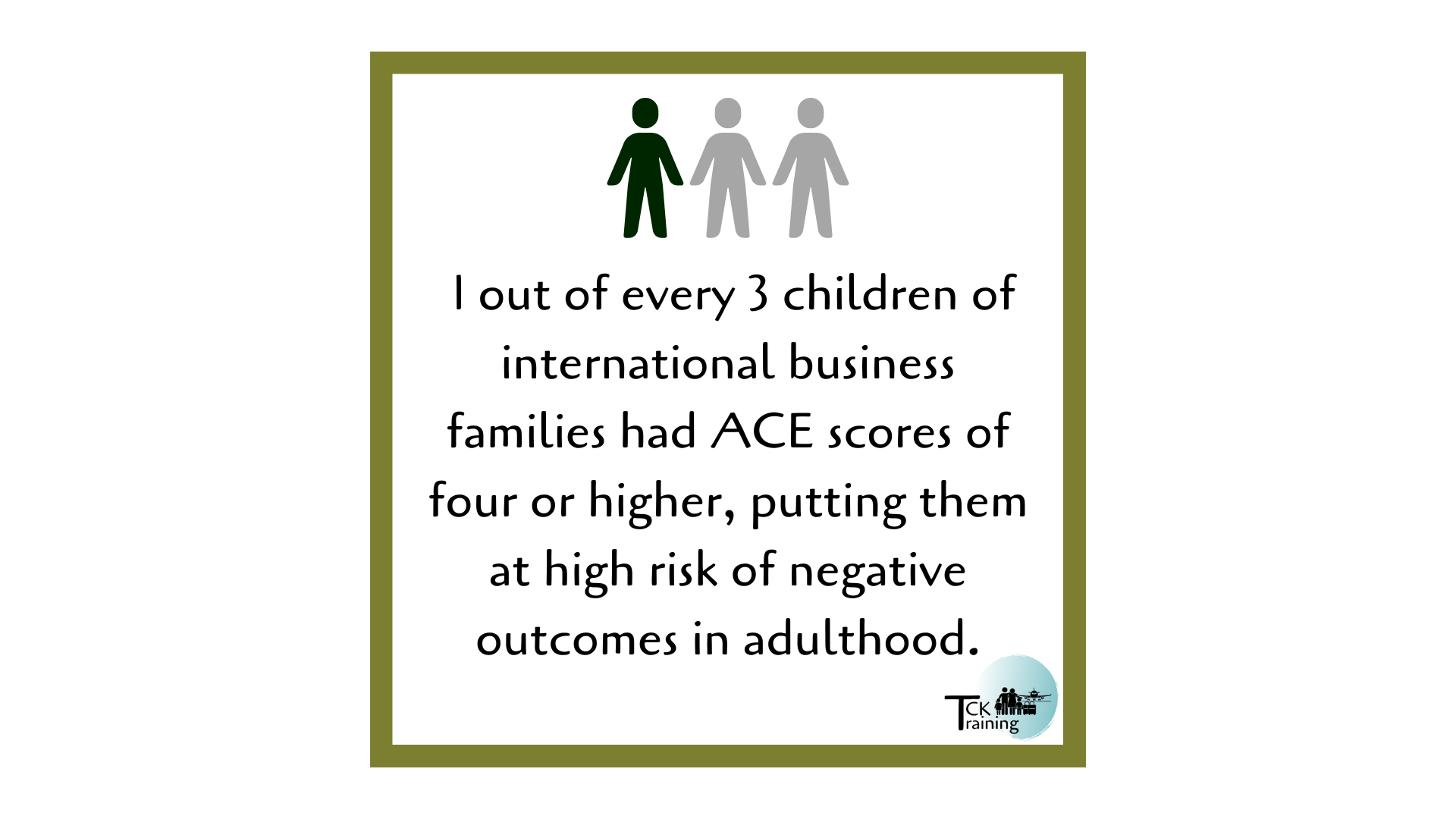
In our survey of globally mobile Third Culture Kids, we asked each respondent why their family lived outside their passport country. We asked for a full list, and also for them to designate a primary reason. The primary reason became the mobility sectors we used to compare different TCK experiences. The sector we labeled “business” was described this way: “Business (includes: company transfer/assignment, entrepreneur, seeking work abroad).” By comparing those who chose this as their primary sector with the full list of reasons a family lived abroad, we were able to break down this sector.
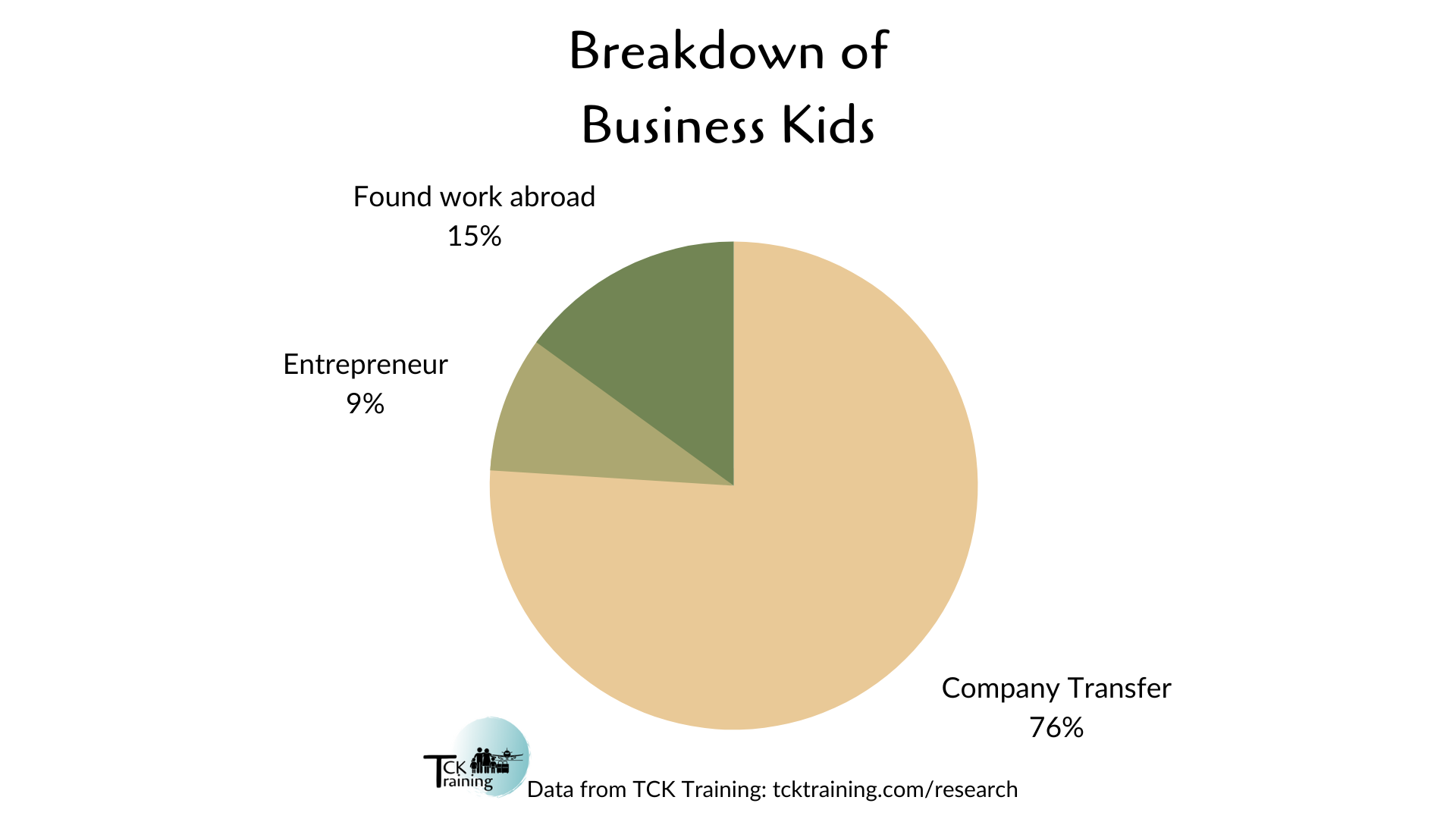
Three quarters moved abroad due to a company transfer - the traditional “expat brat” experience, where a company sends a worker overseas and their family goes along. (This was my own TCK experience as a young teen.) That still leaves 25% who did not have this experience. Their parents were entrepreneurs, running their own businesses, or consciously looked for work abroad rather than being sent by a company. In this blog post we collate statistics regarding the experiences of the children of these International Business Families, looking at the risks and also how to buffer these risks.
Age and Education
The business kids we surveyed came from a range of ages, similar to other sectors (other than the military sector, which was older than the rest). Very few were born before 1960, but this was not a significant difference from other non-military sectors.
Age and Education
The business kids we surveyed came from a range of ages, similar to other sectors (other than the military sector, which was older than the rest). Very few were born before 1960, but this was not a significant difference from other non-military sectors.
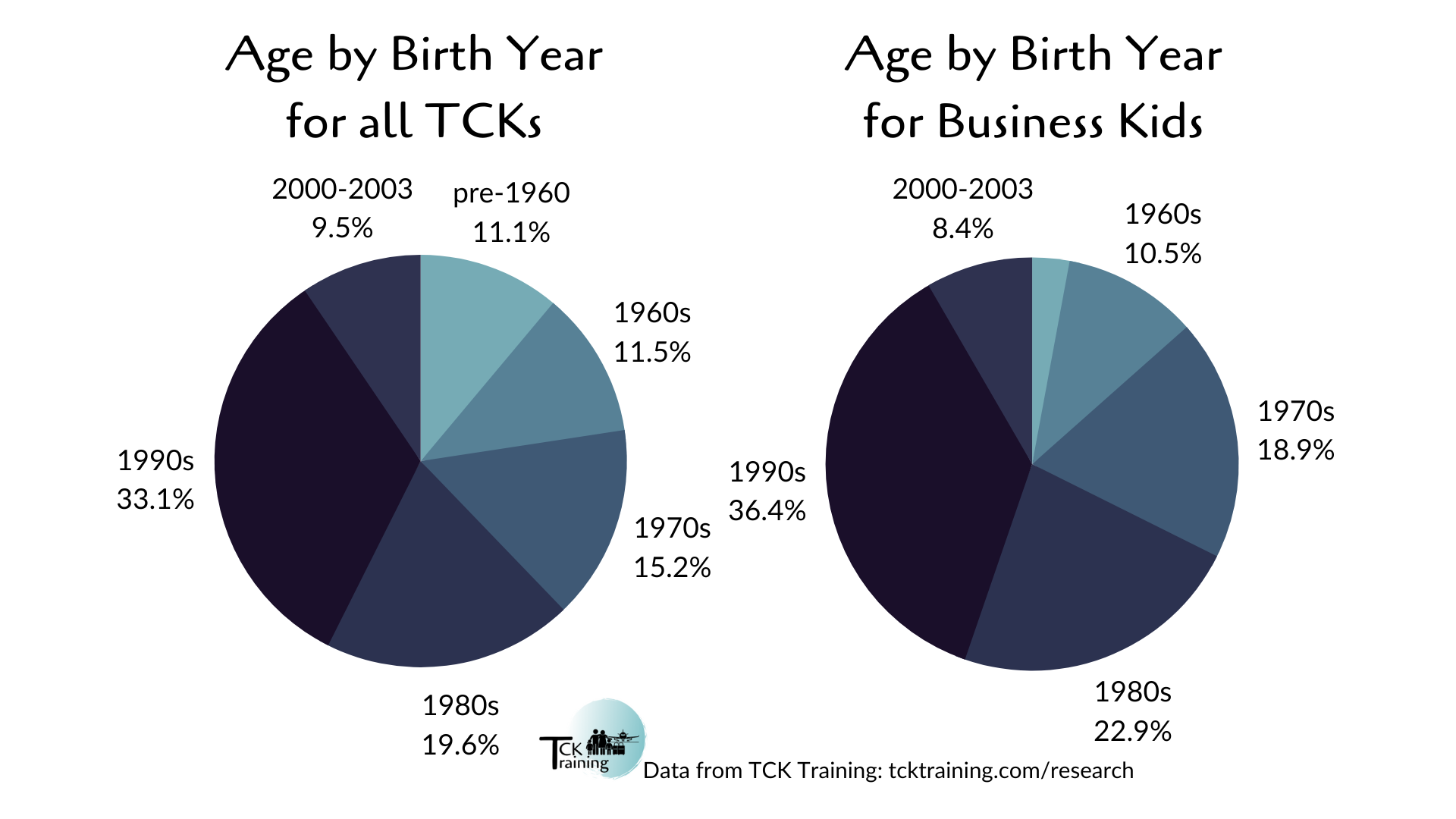
When it came to education, the majority of business kids (57%) attended international schools. Only a very small percentage attended boarding school or were homeschooled (less than 5% combined). While this varied from the overall totals for TCKs we surveyed, it was very similar to other non-missionary sectors.
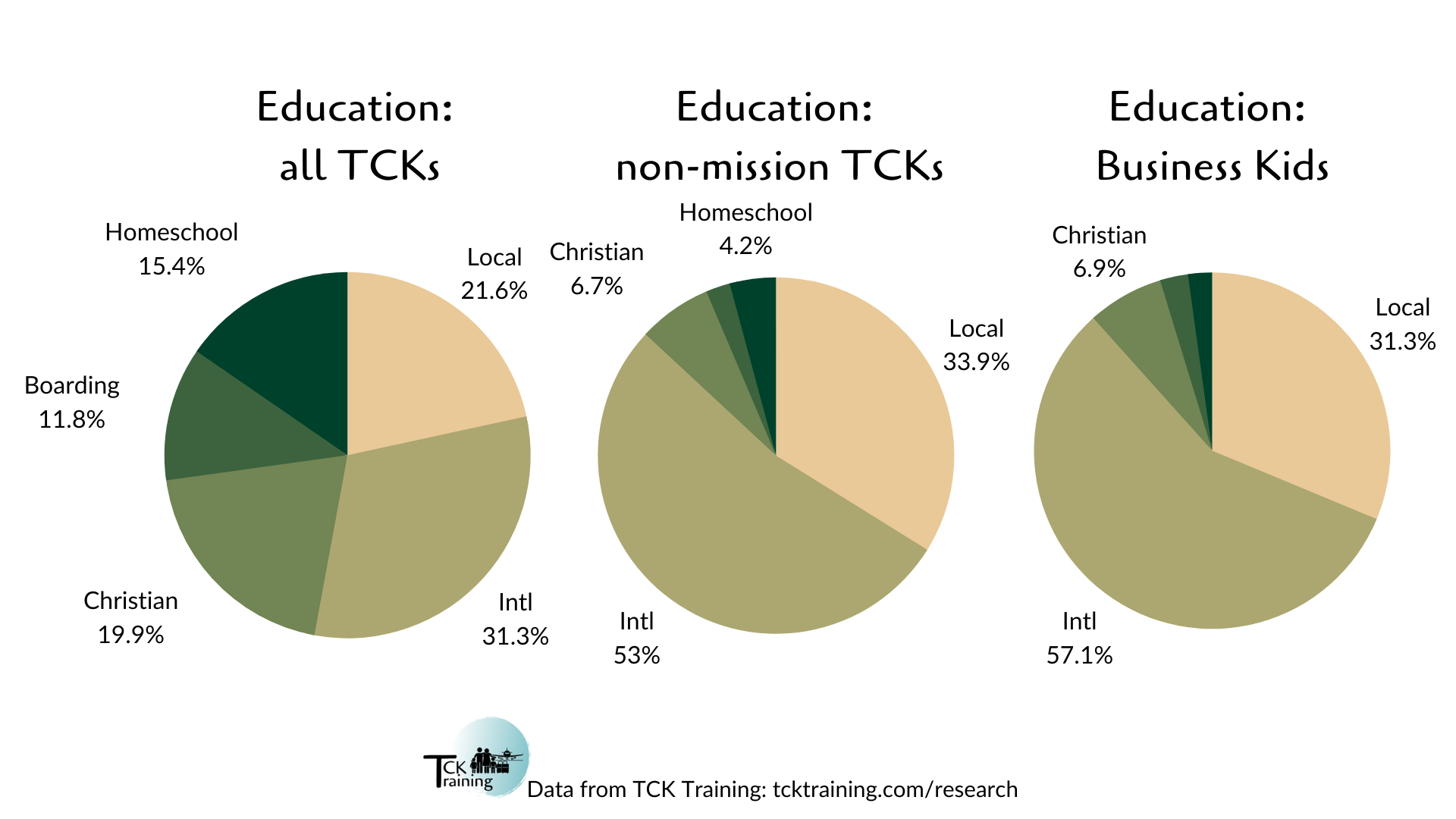
Mobility
Experiences of mobility among business kids were interesting. They were more likely to live in multiple countries than other TCKs, but less likely to experience extreme mobility.
Experiences of mobility among business kids were interesting. They were more likely to live in multiple countries than other TCKs, but less likely to experience extreme mobility.
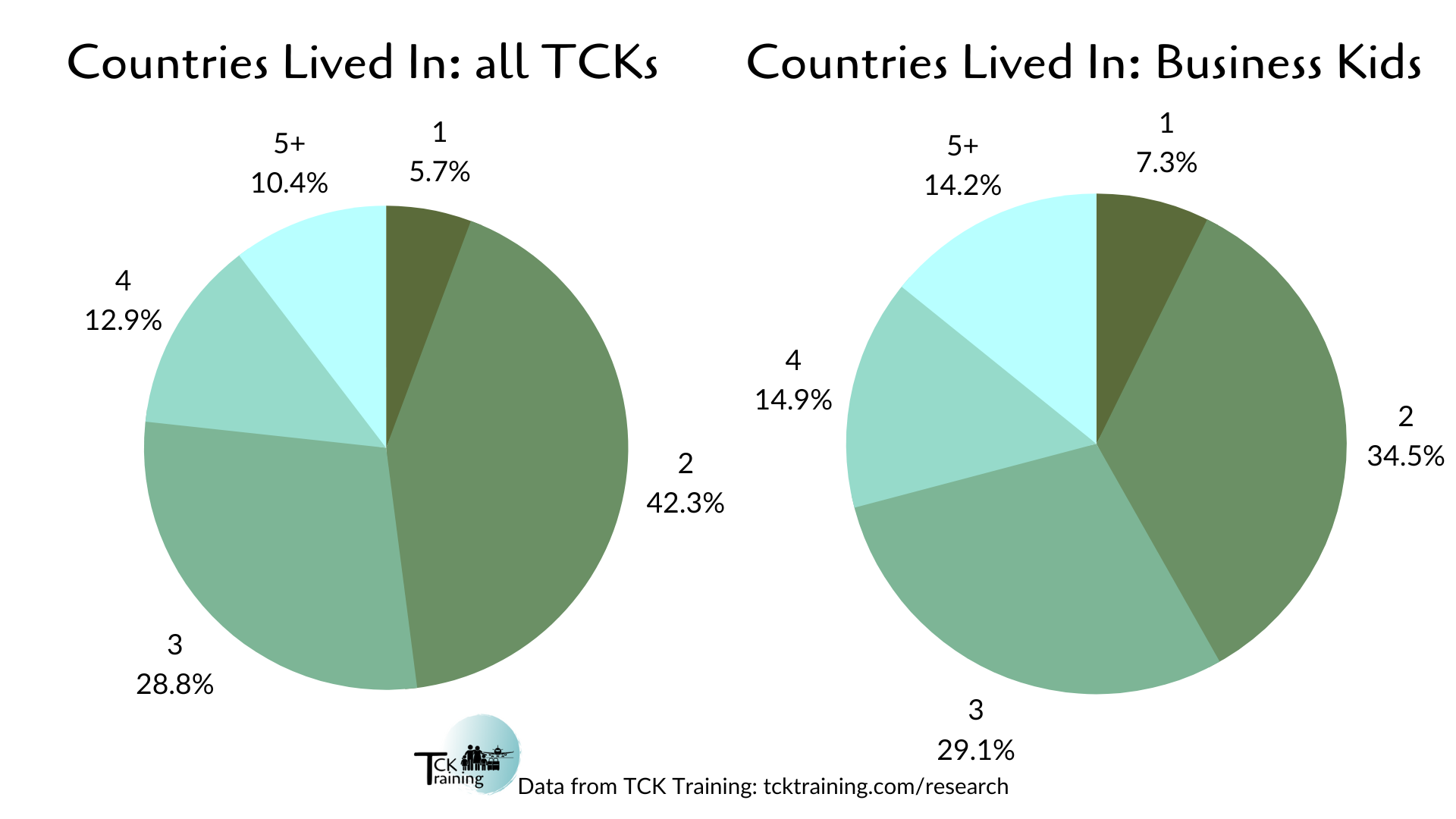
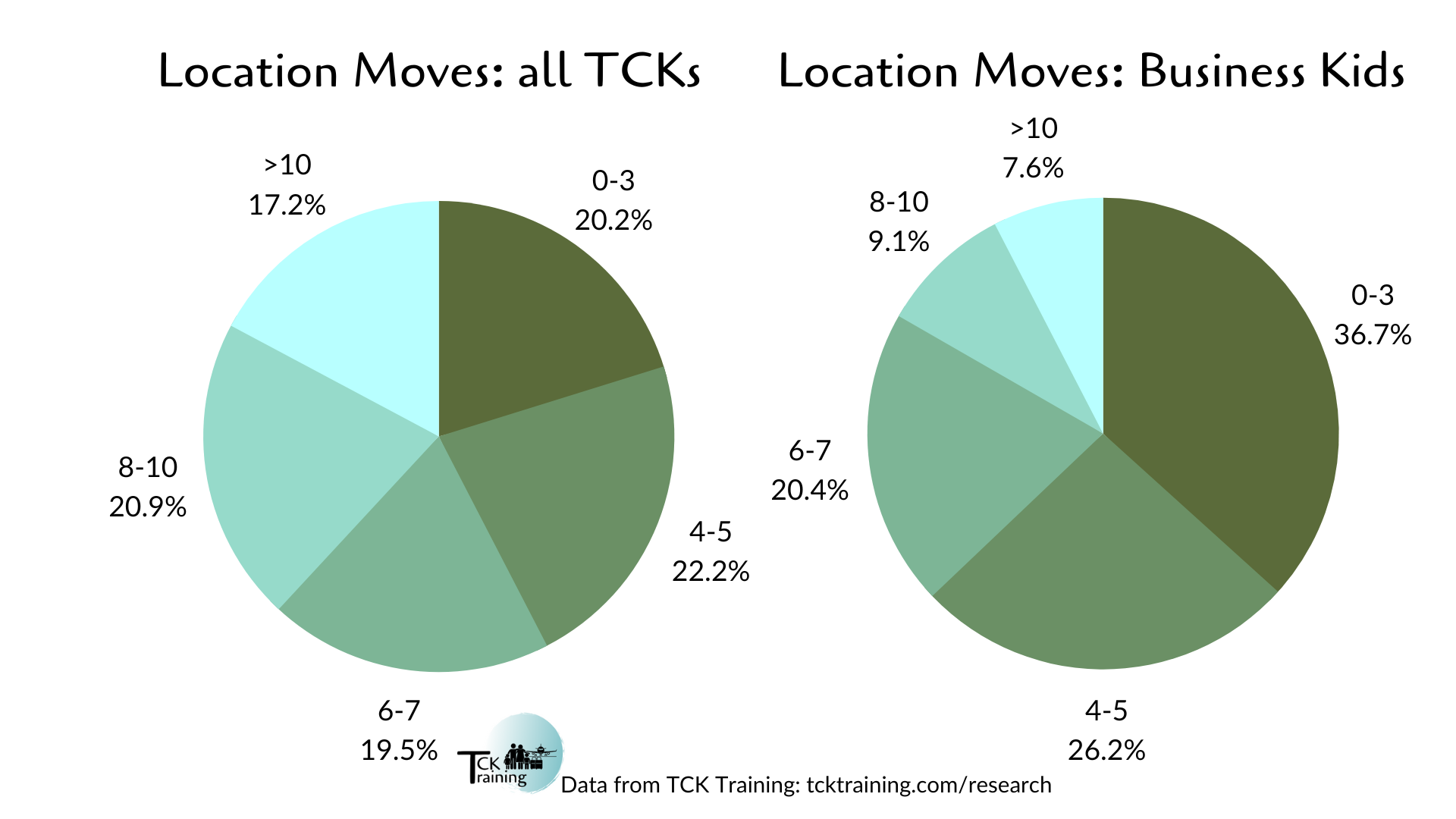
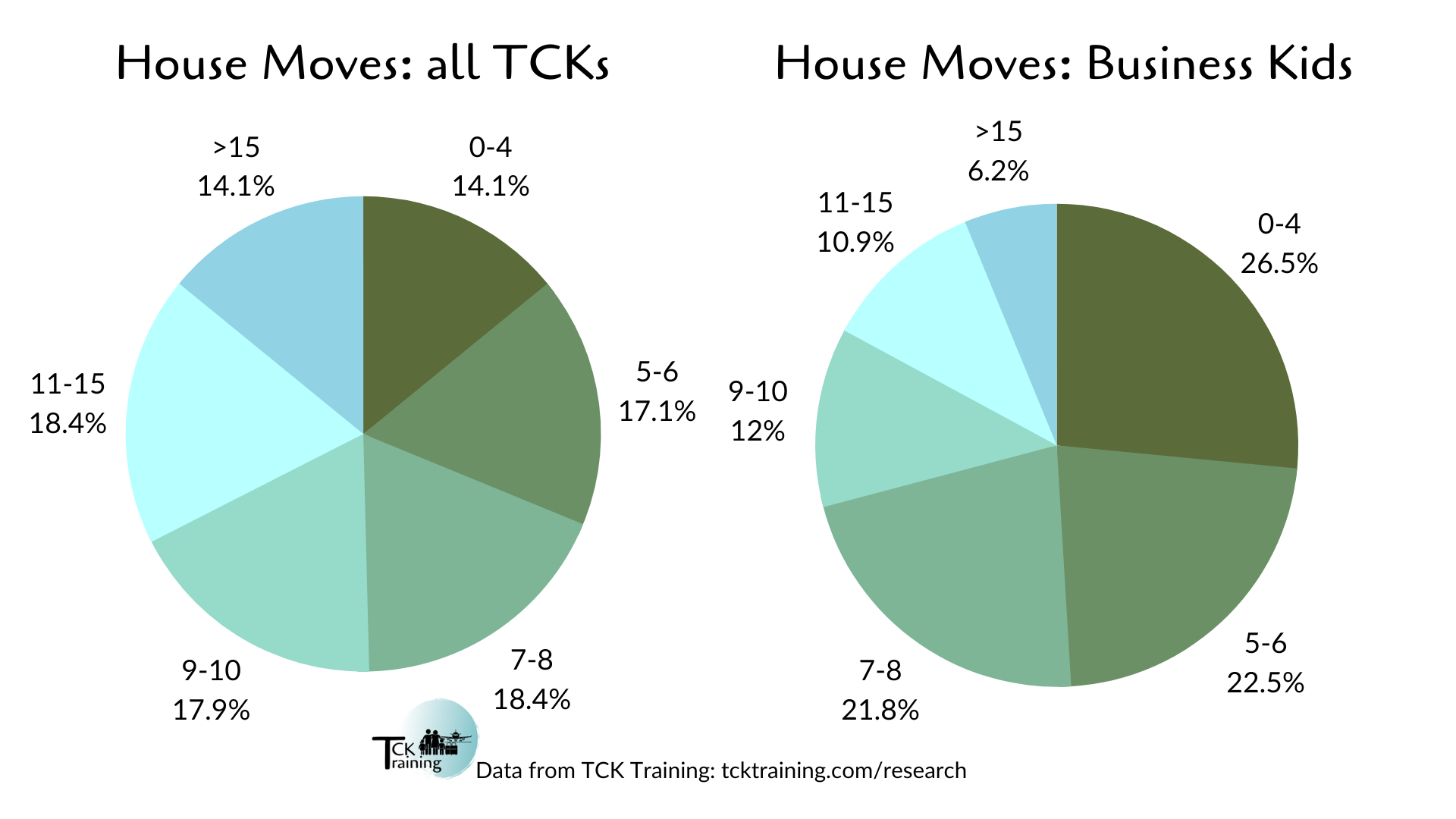
56% of Business Kids moved location five or fewer times before age 18, compared to only 42% of TCKs overall. Half of Business Kids moved house 6 or fewer times before age 18, compared to less than a third of TCKs overall.
This is significant, as our research found that extreme mobility was correlated with higher ACE scores among the TCKs we surveyed.
This is significant, as our research found that extreme mobility was correlated with higher ACE scores among the TCKs we surveyed.
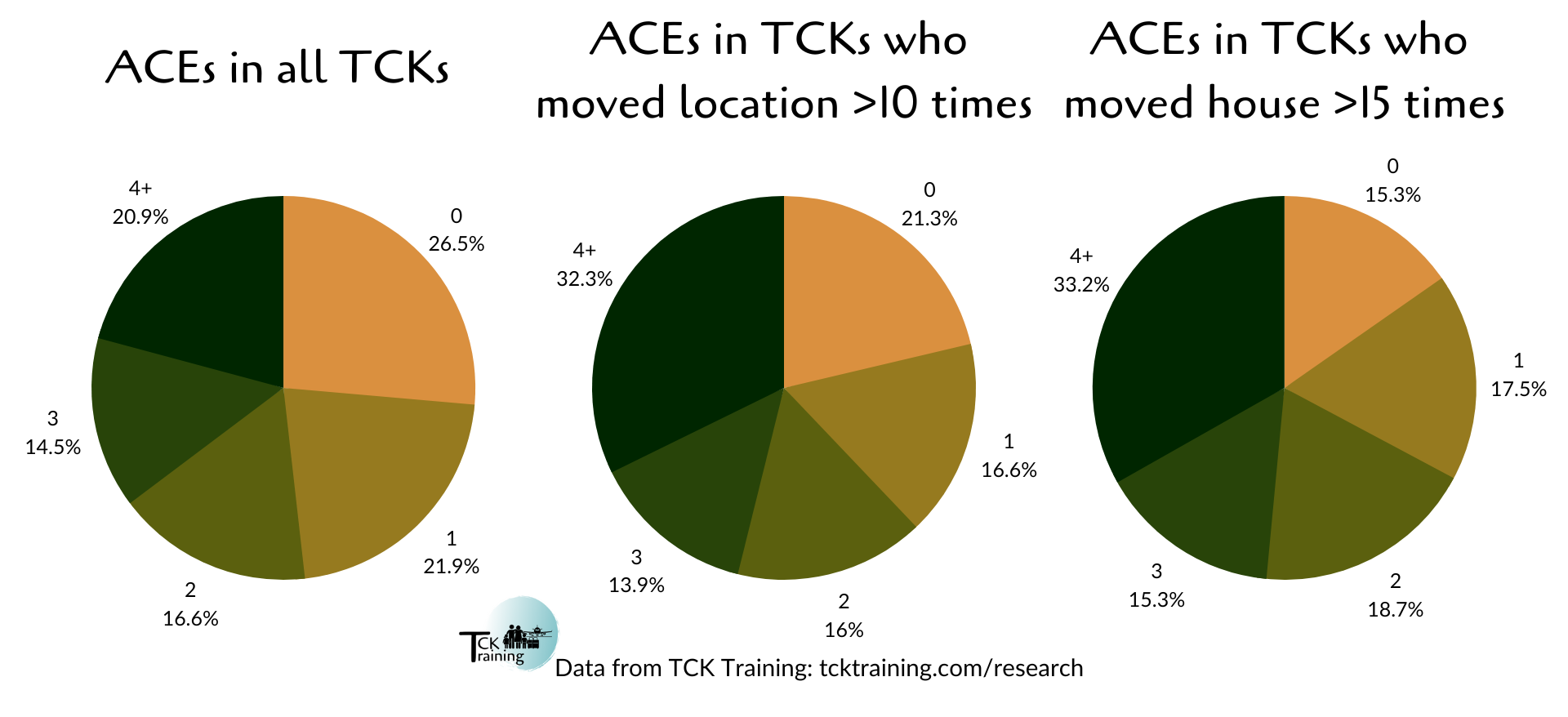
Adverse Childhood Experiences
What are ACE scores? This formula, which has been researched around the world for around 25 years, is a way to quantify the number of types of childhood trauma an individual experienced. A score of 0-10 is assigned based on their experiences, and a score of 4 or higher is associated with higher risk of negative behavioral, psychological, and physical health outcomes.
While high mobility was not as prevalent in Business Kids as other sectors, the Business sector had the highest rate of high risk ACE scores of any sector we surveyed.
What are ACE scores? This formula, which has been researched around the world for around 25 years, is a way to quantify the number of types of childhood trauma an individual experienced. A score of 0-10 is assigned based on their experiences, and a score of 4 or higher is associated with higher risk of negative behavioral, psychological, and physical health outcomes.
While high mobility was not as prevalent in Business Kids as other sectors, the Business sector had the highest rate of high risk ACE scores of any sector we surveyed.
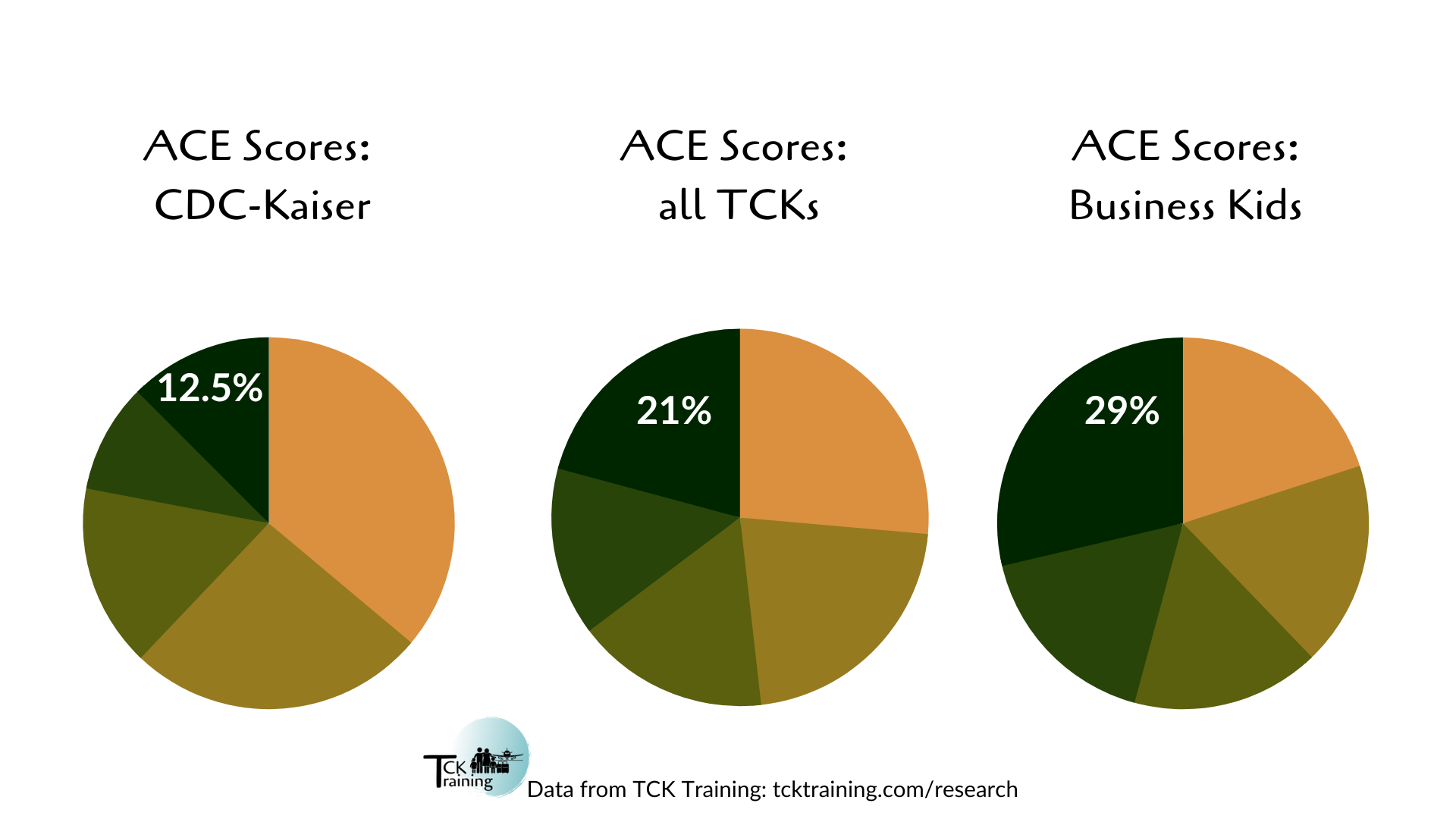
29% of Business Kids had four or more Adverse Childhood Experiences. This statistic should give pause to all international business families, and all companies sending families abroad. This life is correlated with higher risk for children, impacting their long term health and wellness. When asking a family to move abroad, we are asking them to risk their children’s long-term wellness. That said, risk does not equal certainty, and there is a lot we can do to buffer children from these risks.
Positive Childhood Experiences
Our white paper is titled Caution and Hope because while these statistics can be a bit scary, they are not the end of the story. Existing research demonstrates that even when high ACEs are present, the risk they represent can be mitigated through Positive Childhood Experiences (PCEs).
Positive Childhood Experiences
Our white paper is titled Caution and Hope because while these statistics can be a bit scary, they are not the end of the story. Existing research demonstrates that even when high ACEs are present, the risk they represent can be mitigated through Positive Childhood Experiences (PCEs).
Bethell and her coworkers found that having higher counts of PCEs was associated with 72% lower odds of having depression or poor mental health overall as an adult; that those with higher levels of positive experiences were over 3.5 times more likely to have healthy social and emotional support as an adult; and that accumulation of the seven PCEs shifted the outcome positively in adulthood.
Caution and Hope:
The Prevalence of Adverse Childhood Experiences in Globally Mobile Third Culture Kids
A child who goes through many Adverse Childhood Experiences can still thrive in adulthood if their childhood is also filled with Positive Childhood Experiences, of which there are seven types. Three of the seven are based in the home; four of the seven are based in experiences of community outside the home. There is also lots of preventive care we can do to help children process the experiences of grief and loss that go along with transition and mobility, and living in communities where their friends also move away.
Providing adequate preventive care and education of protective factors is a must for all international businesses. Corporate HR should be trained in how to equip families to care for their children before (and while) they go abroad on assignment. Families left on their own without help from the companies sending them on assignment need to know there is information and support available to them.
TCK Training is here to help. We have curricula, workshops, training, memberships, and everything else you need to support families working abroad.
Providing adequate preventive care and education of protective factors is a must for all international businesses. Corporate HR should be trained in how to equip families to care for their children before (and while) they go abroad on assignment. Families left on their own without help from the companies sending them on assignment need to know there is information and support available to them.
TCK Training is here to help. We have curricula, workshops, training, memberships, and everything else you need to support families working abroad.
Empty space, drag to resize
Related blog posts:
Mitigating Risk Factors for International Business Kids
When Business Families Witness or Experience Traumatic Events
Other blog posts in this series:
About the Author
Tanya Crossman grew up in Australia and the US before moving to China at age 21; she has worked with TCKs for 20 years. She is the Director of Research and International Education at TCK Training.
AT TCK TRAINING MARCH IS
Caregivers Appreciation Month!
See how YOU can celebrate
Free resources, giveaways, sales & more!
Free resources, giveaways, sales & more!



